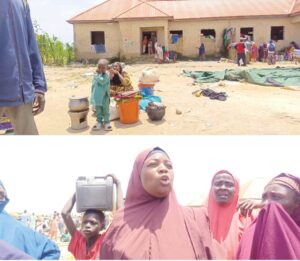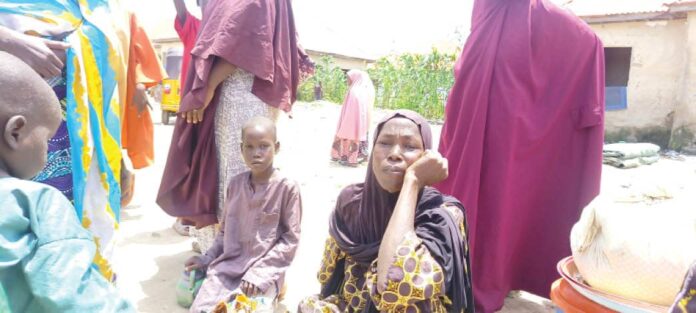Flood: Victims in dilemma after discharge from camps
The decision by Borno State to shut down relief camps for people displaced by the devastating floods that ravaged Maiduguri Metropolitan Council (MMC) and Jere Local Government Area (LGA) has left some families in confusion.
Some survivors of the flood, who were taking refuge in the camps, expressed concerns that the government’s decision would worsen their plight. Many said their homes remain uninhabitable, leaving them with nowhere to go.
Government officials and humanitarian agencies managing the camps have reported that individuals not affected by the flood, including people from Damboa, Bama, Mafa, and Dikwa LGAs, infiltrated the camps to collect food and other aid intended for flood victims.
Borno State’s flood victims’ camps were set up at a time when the state government was working to complete the resettlement of victims of the Boko Haram insurgency, who had been displaced from their ancestral homes for over 15 years.
READ ALSO: Bauchi Senator, Shehu Buba, donates ₦50m to Borno flood victims
Governor Babagana Umara Zulum stated that only camps operating within schools would be closed to allow the resumption of academic activities. However, many individuals, like Zara Isa from Fariya, expressed uncertainty about where to go after leaving the camps, as their homes remain submerged in floodwater.
“I arrived at this camp six days ago with my six children. Today, they asked everyone to leave. We were given food and money, but we didn’t have anywhere to go,” Zara said.
Another survivor, Habiba Idris, said she and her 10 children were discharged from the camp after only two days. She expressed fear about their next move, saying: “Where else can we go for goodness sake?”
Some survivors, like Rabi Ibrahim, described the extent of the damage to their homes. “We checked our house when the water receded. The flood pulled down the roof and back fence, and the entrance building had collapsed,” she said.
*Government to Provide Temporary Tents*
The Commissioner of Information, Usman Tar, stated that temporary tents would be provided to survivors to pitch at their homes while the government assesses the level of destruction and assists with rebuilding efforts. Since the flood disaster began, the state has established 36 Internally Displaced Persons (IDP) Camps to support thousands of residents.
*Graveyard Issues*
At the Gwange graveyard, residents complained of a pungent smell, as floodwater destroyed many graves. Environmental workers sent by the government had fumigated the area, but the soil remained too loose to walk on, preventing the repair of damaged graves.
*Controversy Over Two-Week Closure*
The state government announced plans to close all 32 relief camps within two weeks, a decision that sparked controversy. The Information Commissioner said the camps would not be sustained beyond this period as the floodwaters were expected to recede.
However, during a meeting with United Nations (UN) officials, Governor Zulum clarified that camps for those whose homes were still inhabitable would remain open, but warned against opening additional relief centres indiscriminately. He expressed concerns about non-victims taking advantage of relief efforts and urged the UN to assist with rebuilding homes, hospitals, schools, and critical infrastructure.
Deputy National Humanitarian Coordinator, Esty Sutyoko, described the flood situation in Maiduguri as a “crisis within crisis” and called on the government to provide temporary shelter before returning displaced persons to their homes.
She promised that the UN would work closely with the Borno State Special Adviser on Humanitarian Affairs, Dr. Mairo Mandara, to find immediate and long-term solutions to the flood crisis.
Follow the Neptune Prime channel on WhatsApp: https://whatsapp.com/channel/0029Va74ZvU2v1IqKByXoX3d
Do you have breaking news, interview request, opinion, suggestion, or want your event covered? Email us at neptuneprime2233@gmail.com


